Personal development and self-improvement are often used interchangeably, yet they have distinct differences. Personal development focuses on long-term growth and overall well-being, encompassing areas like emotional, social, and intellectual aspects of life. It aims at holistic self-growth and lasting changes that contribute to long-term success. On the other hand, self-improvement is about making measurable and immediate changes in specific areas such as skills, habits, and productivity. This article delves into the core concepts, benefits, and techniques of both, clarifying their unique paths and benefits effectively.
Understanding Personal Development: Core Concepts and Benefits
Personal development is an ongoing process of self-improvement in various areas of life, such as mental well-being, emotional health, social skills, and career progression. Understanding personal development requires an appreciation of its core concepts and acknowledging the benefits it brings. One of the fundamental aspects of personal development is the focus on growth and self-awareness. By recognizing personal strengths and weaknesses, individuals can pursue a more balanced and fulfilling life, leading to increased confidence and a clearer sense of purpose.
At its core, personal development emphasizes the importance of setting realistic and achievable goals, and the process often involves a combination of self-reflection and actionable strategies. These strategies can include seeking mentorship, engaging in continuous education, or developing new skills through practice and training. The benefits of investing in personal development are multifaceted, spanning enhanced interpersonal relationships, improved professional performance, and heightened emotional intelligence.
Knowing yourself is the beginning of all wisdom – Aristotle
Moreover, personal development promotes resilience by encouraging individuals to embrace challenges as opportunities for growth. This mindset shift not only boosts problem-solving skills but also fosters a sense of empowerment. As individuals become more adept at navigating life’s complexities, they are more likely to experience long-term success and personal satisfaction. The pursuit of personal development, therefore, is not just about achieving immediate goals but cultivating a lifelong commitment to learning and self-betterment.
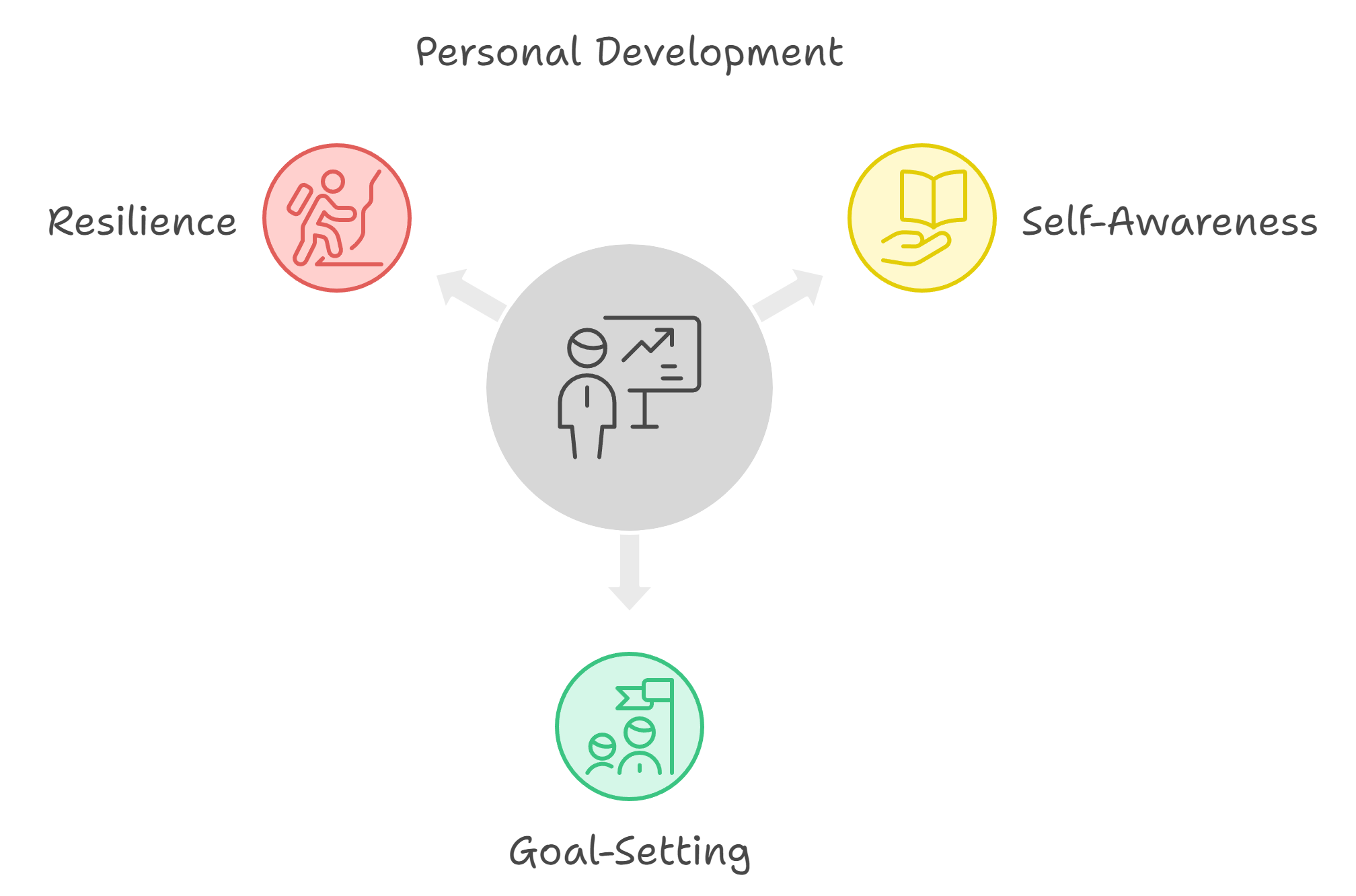
Diving into Self-Improvement: Practical Steps and Techniques
Self-improvement is a journey filled with numerous paths and techniques. It involves taking actionable steps towards improving aspects of your life, whether it be your mental health, physical well-being, or skill set. While personal development focuses on broader, lifelong growth, self-improvement involves specific, targeted actions that yield measurable results. Below, we will dive into some practical steps and techniques that can aid anyone on their self-improvement journey.
1. Setting SMART Goals
An effective way to ensure progress in self-improvement is by setting SMART goals, which are Specific, Measurable, Achievable, Relevant, and Time-bound. By having clear and structured objectives, you can easily track your progress and make necessary adjustments. For example, instead of saying, I want to read more, a SMART goal would be, I will read two books per month for the next six months.
2. Engaging in Continuous Learning
Learning should never stop, regardless of age or experience. With the wealth of resources available today, expanding your knowledge and skills is more accessible than ever. Online courses, webinars, podcasts, and books are invaluable resources for continuous learning. As personal development encourages a growth mindset, self-improvement benefits significantly from the perpetual pursuit of knowledge.
3. Cultivating Healthy Habits
Implementing small, consistent habits can lead to significant improvements over time. Many self-help gurus advocate for the establishment of daily routines that enhance your physical and mental well-being. Simple habits like drinking enough water, exercising, and practicing mindfulness or meditation can collectively have a profound impact on your overall quality of life.
| Habit | Benefit |
|---|---|
| Daily Exercise | Improves physical health and mental clarity |
| Meditation | Reduces stress and enhances focus |
| Reading | Expands knowledge and cognitive abilities |
4. Seeking Feedback and Reflection
Constructive feedback is invaluable for personal growth. Engage with mentors, coaches, or trusted friends who can provide insights and suggestions on areas of improvement. Regular self-reflection also allows you to evaluate your progress, celebrate your achievements, and adjust your strategies as needed.
5. Practicing Self-Discipline
Self-improvement requires a level of self-discipline to stay committed to your goals and resist distractions or temptations. Techniques like time management, self-regulation, and accountability can significantly enhance your self-discipline. Some people find it helpful to use planners or productivity apps to keep track of their tasks and goals.
6. Nurturing Relationships
Positive relationships can provide emotional support, motivation, and new perspectives. Surround yourself with encouraging and like-minded individuals who can inspire you to stay on your self-improvement path. Join communities, forums, or group activities where you can connect with others sharing similar goals and challenges.
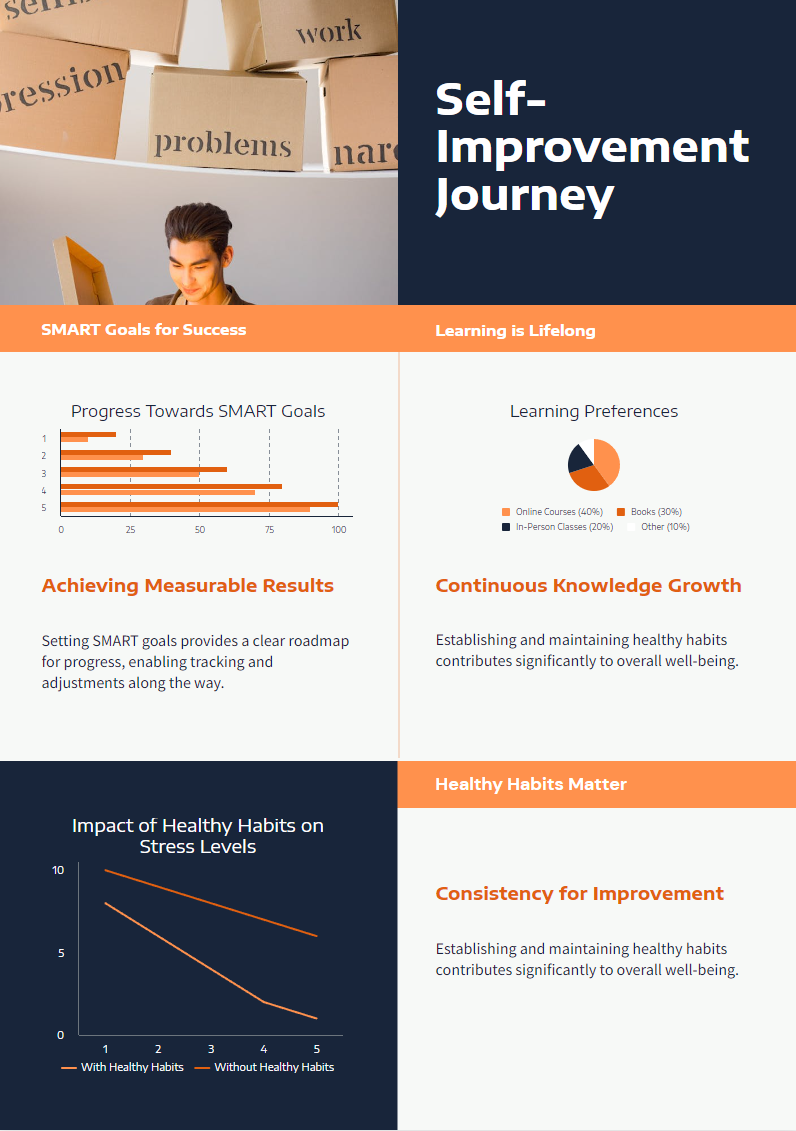
By integrating these practical steps and techniques into your life, you can achieve measurable improvements and maintain a progressive mindset. While personal development serves as the umbrella for overall growth, focusing on specific self-improvement actions helps you tackle particular areas of interest and see tangible results.
Personal Development Vs Self-Improvement: Key Differences Explained
When discussing Personal Development and Self-Improvement, it’s easy to conflate the two since both involve making positive changes in one’s life. However, they are distinct concepts that cater to different aspects of personal growth. Understanding the nuances between Personal Development and Self-Improvement can significantly affect your approach to becoming the best version of yourself.
Personal Development refers to a lifelong process of enhancing one’s qualities, skills, and attributes. It encompasses a broad spectrum of activities and objectives, from cultivating emotional intelligence to improving communication skills. The primary focus is on achieving long-term growth by exploring and nurturing all areas of one’s life. For instance, engaging in continuous learning through courses, attending workshops, or seeking mentorship are all part of Personal Development. It is more holistic and focuses on gradually transforming various aspects of life over time.
On the other hand, Self-Improvement is often more targeted and short-term. It involves setting specific goals and implementing deliberate actions to achieve measurable, immediate outcomes. Examples of Self-Improvement activities include adopting a new fitness routine to lose weight, learning time management techniques to increase productivity, or reading books to acquire new knowledge in a short period. The ultimate goal is to attain quick and tangible results that can be immediately assessed.
In summary, while Personal Development is an ongoing process aimed at overall growth and enhancing life skills, Self-Improvement focuses on immediate, actionable goals that yield faster results. Both are essential for a well-rounded approach to personal growth, but recognizing the differences can help you tailor your strategies for both long-term success and quick wins.
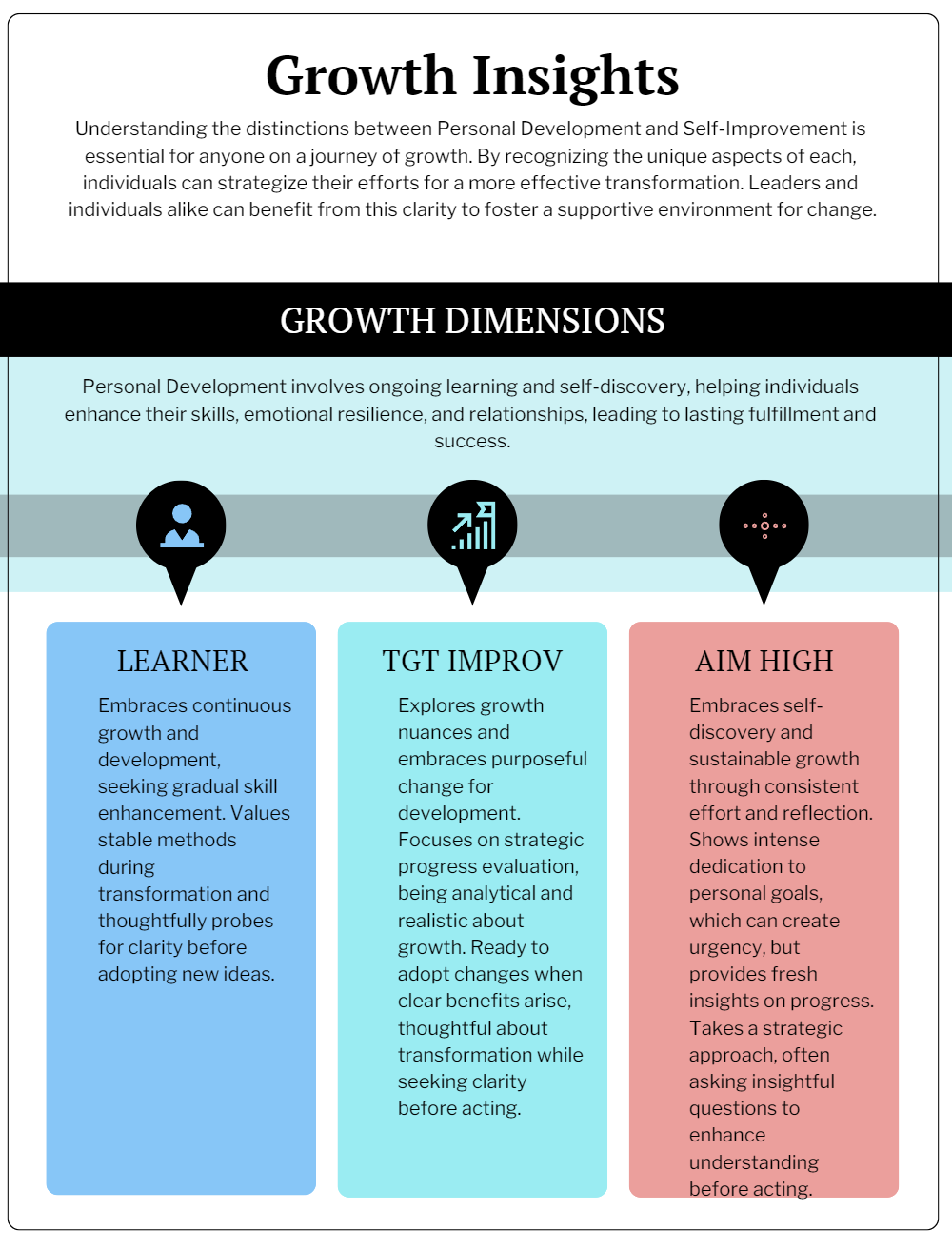
How Personal Development Drives Long-Term Success
In today’s fast-paced world, personal development has emerged as a crucial factor contributing to long-term success. The core idea behind personal development lies in the continuous improvement of one’s skills, attitudes, and personality traits, leading to the achievement of personal and professional goals. Emphasizing personal growth fosters resilience, adaptability, and a sense of purpose, which are vital in navigating the complexities of modern life.
To better understand how personal development drives long-term success, it’s helpful to break down its key components. Personal development encompasses areas such as emotional intelligence, time management, effective communication, goal setting, and continuous learning. Each of these elements plays a significant role in building a strong foundation for enduring success. Below is a table highlighting the core areas of personal development and their impact on long-term outcomes:
| Core Area | Impact on Long-Term Success |
|---|---|
| Emotional Intelligence | Improves interpersonal relationships and decision-making abilities. |
| Time Management | Enhances productivity and helps in reaching goals efficiently. |
| Effective Communication | Fosters better collaborations and minimizes misunderstandings. |
| Goal Setting | Provides a clear direction and motivation to achieve objectives. |
| Continuous Learning | Keeps skills and knowledge up-to-date in a rapidly changing world. |
Moreover, personal development is not just about professional success; it significantly enhances one’s quality of life. For instance, improving emotional intelligence helps individuals to manage stress better, maintain healthier relationships, and develop empathy. Similarly, effective communication skills are crucial in both personal and professional settings, enabling individuals to express their thoughts clearly and build meaningful connections with others.
Another essential aspect of personal development is goal setting. Setting well-defined goals provides a roadmap for success and keeps individuals motivated and focused on their long-term aspirations. By regularly reviewing and adjusting these goals, individuals can ensure that they remain on the right track and avoid potential pitfalls.
He who has a why to live can bear almost any how – Friedrich Nietzsche
Continuous learning is also a cornerstone of personal development that directly ties into long-term success. In an ever-evolving world, staying updated with the latest knowledge and skills is imperative. Engaging in lifelong learning cultivates a growth mindset, making individuals more adaptable to change and better equipped to handle new challenges.
In conclusion, personal development is a multifaceted and dynamic process that significantly impacts long-term success. By focusing on enhancing emotional intelligence, time management, effective communication, goal setting, and continuous learning, individuals can build a robust foundation for enduring achievement. Investing in personal development not only ensures professional success but also leads to a more fulfilling and balanced life.
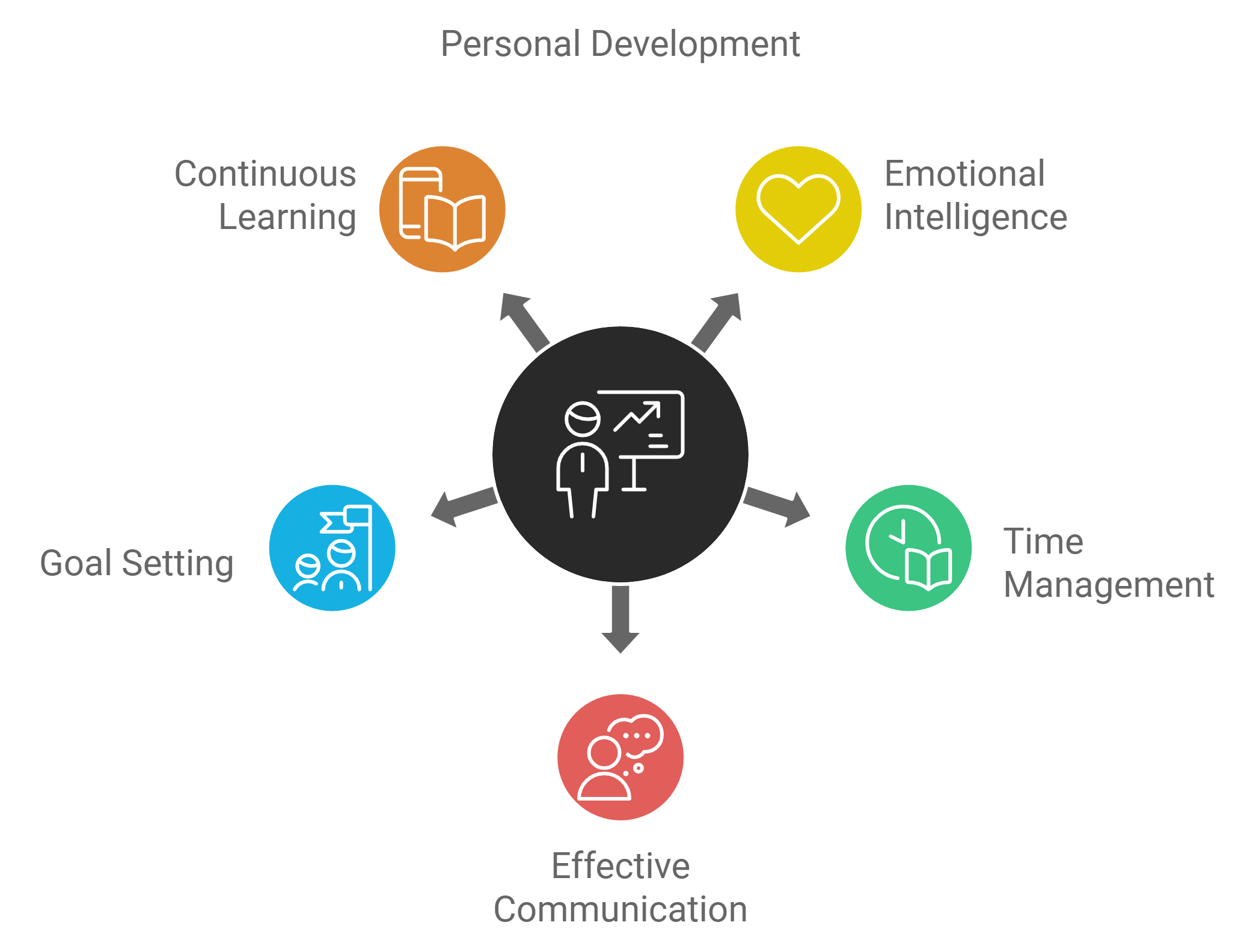
Self-Improvement: Achieving Measurable and Immediate Results
Embarking on a journey of self-improvement often yields quick and tangible results, making it an attractive option for many. Unlike personal development, which focuses on long-term growth and broader aspects of one’s life, self-improvement is often about honing specific skills or behaviors to experience immediate benefits. This article will elucidate the practical steps and techniques you can take to achieve these measurable and immediate results.
Firstly, setting clear and achievable goals is paramount. Whether you aim to enhance your time management skills, cultivate healthier habits, or boost your productivity, specificity is key. Establishing SMART goals—Specific, Measurable, Achievable, Relevant, and Time-bound—helps create a structured roadmap for your journey.
Implementing actionable techniques is the next step. Consider employing the Pomodoro Technique for improved focus and time management. This method involves working for a set period, typically 25 minutes, followed by a short break. Such techniques offer immediate feedback on productivity and focus, allowing for quick adjustments and improvements.
Furthermore, maintaining a progress tracking system is crucial for achieving immediate results. By using tools like journals, spreadsheets, or mobile apps, you can visualize your progress over time. Tracking metrics such as time spent on tasks, completion rates, or even physical health indicators can provide a sense of accomplishment and motivate continuous effort.
We must be willing to let go of the life we planned so as to have the life that is waiting for us – Joseph Campbell
In addition to these methods, fostering a growth mindset is essential. Embracing challenges, learning from feedback, and celebrating small victories contribute to sustained self-improvement. According to psychologist Carol Dweck, a growth mindset drives individuals to overcome obstacles and view failures as opportunities for learning, thus delivering quick wins and building long-term resilience.
Self-improvement is the act of working on yourself with the intent to make immediate and measurable changes.
Lastly, leveraging resources such as online courses, workshops, and books can offer guidance and support. Platforms like Coursera, Udemy, and Skillshare provide a plethora of courses designed to boost various skills ranging from communication and leadership to technical prowess.
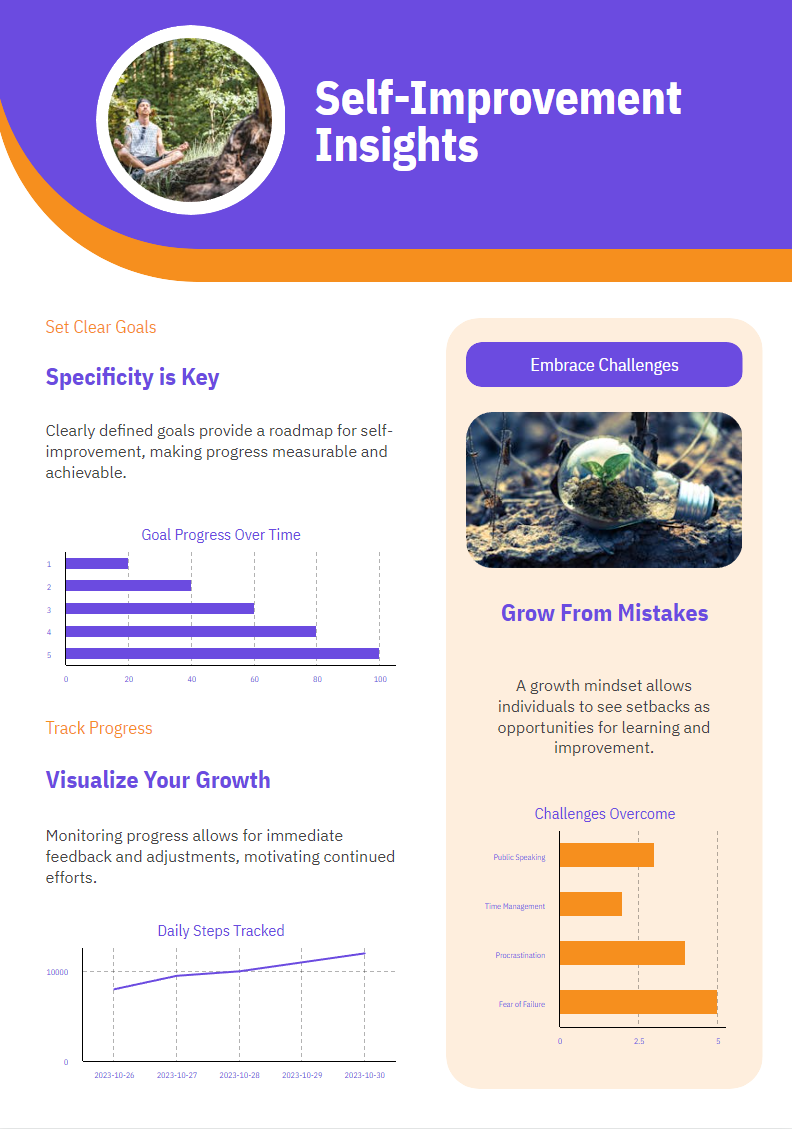
Frequently Asked Questions














